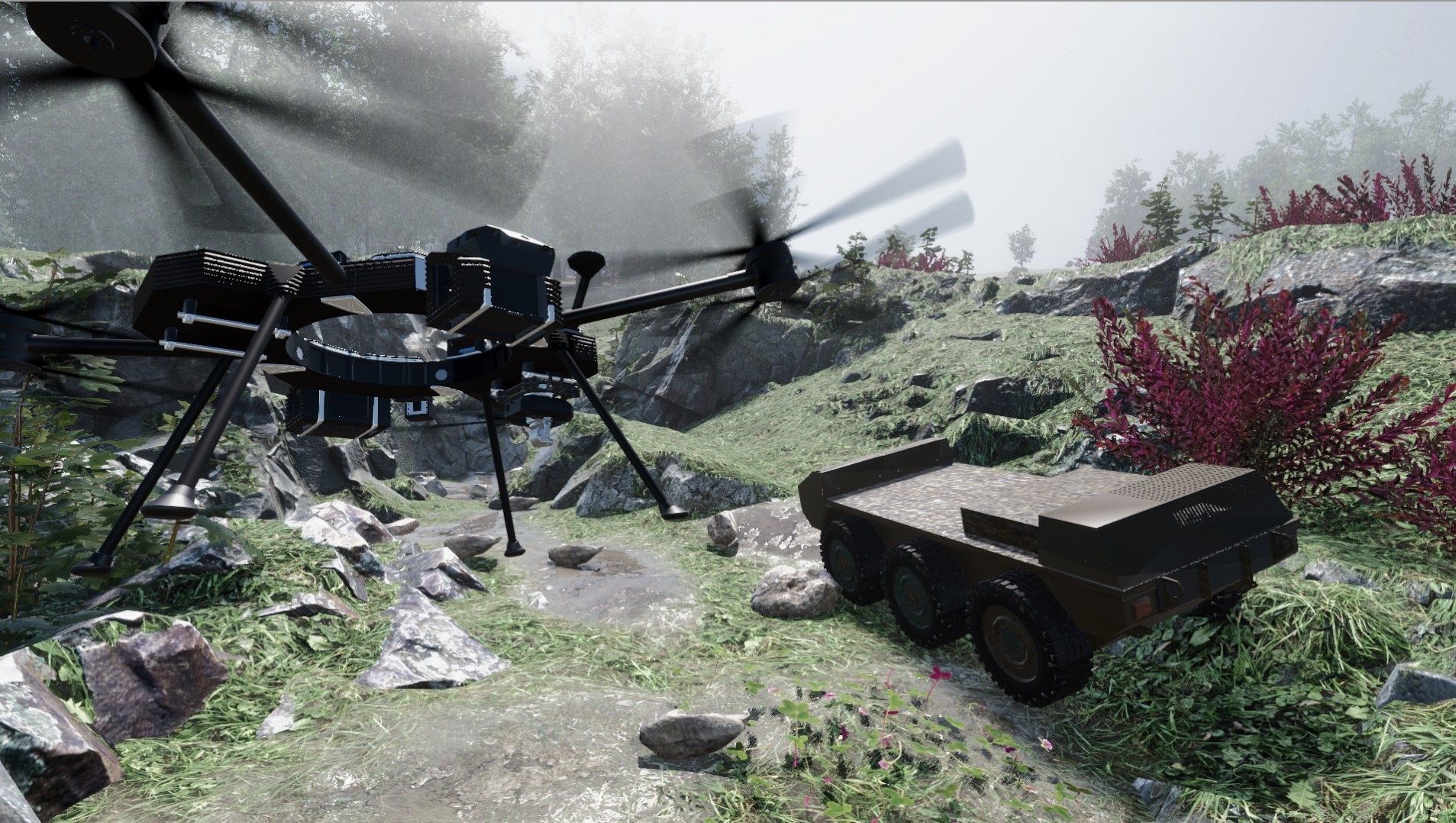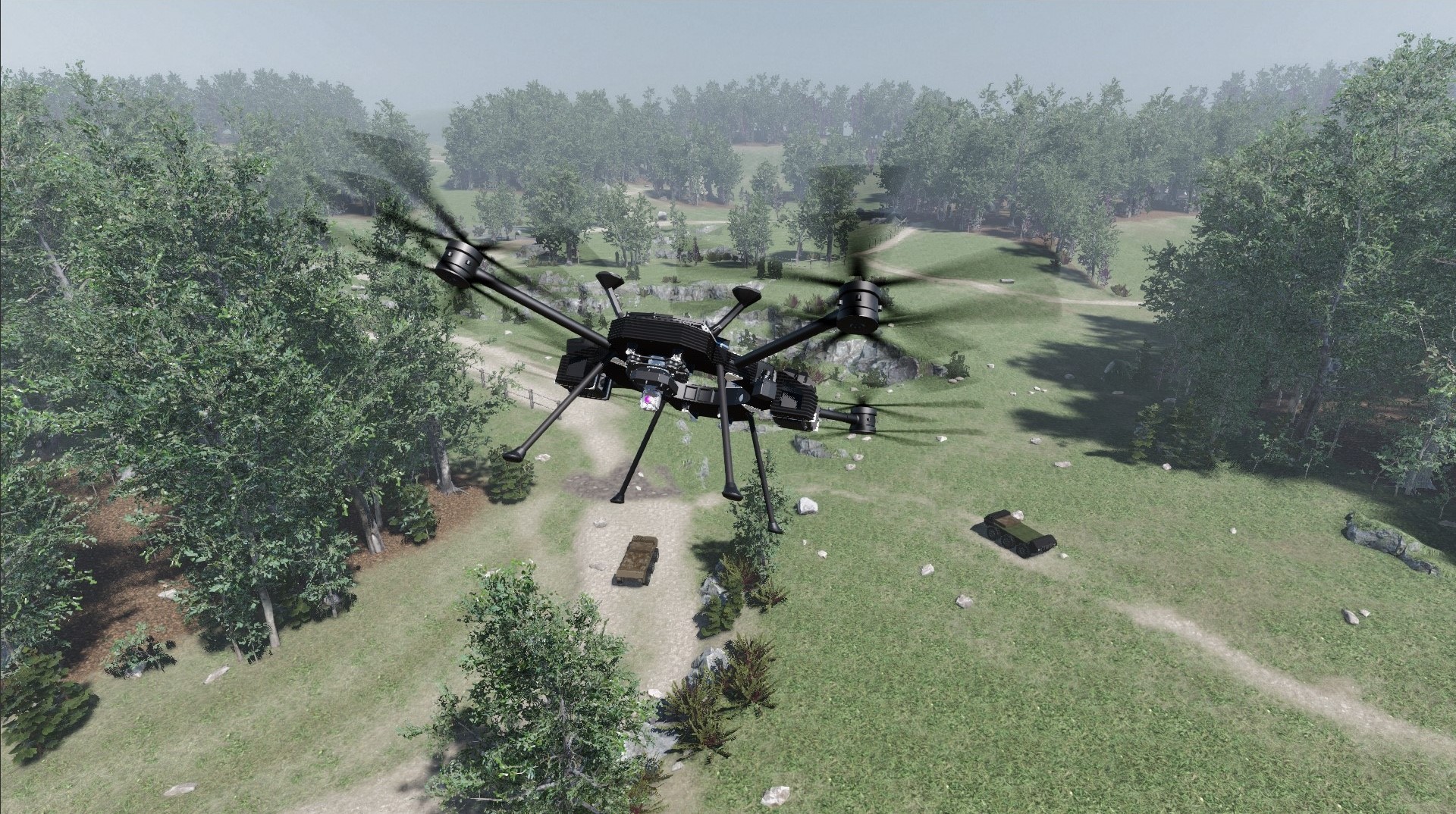Thales partners with Dstl, Catalyst and DCE on hybrid testing for crewed and uncrewed platforms

Above: Thales, Catalyst and DCE are developing a system for multidomain experimentation and testing on crewed and uncrewed systems.
Courtesy Catalyst
Thales in the UK, under contract from Dstl, is advancing crewed-uncrewed integration, developing a system of systems digital twin environment for experimentation on the operation of Land Robotics and Autonomous Systems (RAS).
Research is ongoing for the project entitled, ‘Land Robotics and Autonomous Systems Ecosystem of Digital Twin Development and Experimentation’ (Land RAS EDT), and the consortium of Thales, Catalyst and DCE are making great progress towards final live trials and demonstrations which are scheduled for early 2025.
Land RAS EDT is a hybrid ecosystem, allowing operators and researchers to utilise a common architecture and interface to plan and experiment in both the virtual and physical domain. The platform enables the operation of virtual and physical systems through one interface, which allows for endless experimentation opportunities. The development of Land RAS EDT will initially be designed to enable the exploration of RAS in the beyond visual line of sight (BVLOS) reconnaissance role. It will also provide a platform for better understanding the contribution of RAS to the Army’s intent to fight by recce-strike at all levels.
Ultimately, the aim of the programme is to enable early experimentation in the virtual domain and allow for more effective multidomain integration through the evolution and extension of existing open architectures and research in the combination of crewed and uncrewed systems. This will reduce the risks, costs and timescales associated with the introduction of new systems and concepts into the armed forces through embracing spiral development. For this project, the facility will incorporate Thales’ DigitalCrew and other AI enablers to better understand system effectiveness of such platforms and the benefits that they provide through a reduction of cognitive burden on the operator.
Catalyst has deep expertise in electronic architecture, synthetic environment modelling, simulation and experimentation. This expertise has been used to create a synthetic environment and digital twins of all physical platforms. DCE specialise in open architectures, developing technologies for robotic and autonomous systems, and is extending its Marionette control system for command and control (C2) of the project’s uncrewed ground vehicles. Thales, Catalyst and DCE are working to develop a system designed to include various crewed and uncrewed vehicles for multi-domain experimentation and testing.

Image courtesy Catalyst
Land RAS EDT consists of a physical mobile crewed platform, running a generic vehicle architecture (GVA) equipped with in service and next generation Thales optronics sensors. Through the use of mission planning software, the mobile crewed platform (or any accredited user on the network) can control and view the movement of the uncrewed, autonomous vehicles. All systems and vehicles have a 'digital twin' in the virtual world. Thales and partners’ open architecture experience will allow Land RAS EDT to inform both new and existing programmes, improving efficiencies for defence procurement and, subsequently, reducing the cost and time of physical trials. Furthermore, Thales offers a platform, sensor, and software agnostic approach to integration, boosting the cost efficiencies associated with the research programme and final experimentation system.
Guy Powell, Principal Advisor - Land Autonomy, Dstl said: “Robotic and Autonomous Systems are transforming warfare, but are rapidly evolving. The open and modular architectures developed in this project should better enable the Army to rapidly adapt and integrate emerging RAS technologies with in service platforms such as Ajax at the pace of relevance. This, together with the use of digital twin environments, should provide a critical enabler to reduce risks, costs and timescales associated with integration and spiral development of RAS capability into the force.”
The world of uncrewed vehicles is rapidly evolving with many systems moving away from traditional, crewed fleets. Land RAS EDT enables the customer and end users to build on the vast open architecture experience of Thales and its partners, Catalyst and DCE, to extend exploration into autonomous systems and robotics. By incorporating artificial intelligence and Thales’ DigitalCrew, Land RAS EDT reduces the burden on key decision makers on the battlefield, leading the way in bridging the gap between crewed and uncrewed systems. Thales’ DigitalCrew will be deployed on UGVs, UAVs and command vehicles to autonomously detect and classify objects of interest. This information will be shared with the wider network to create a Common Operating Picture (COP).
Stephen McCann, Managing Director, Thales in the UK said: “In recent times, the growing significance of autonomy and artificial intelligence has become increasingly apparent, reshaping the landscape of security strategies worldwide. This important research partnership between Dstl, Thales and multiple SMEs will advance the UKs understanding of Digital Twins and open architectures and explore how crewed, optionally crewed and uncrewed systems can co-exist in complex, multidomain architectures.”











